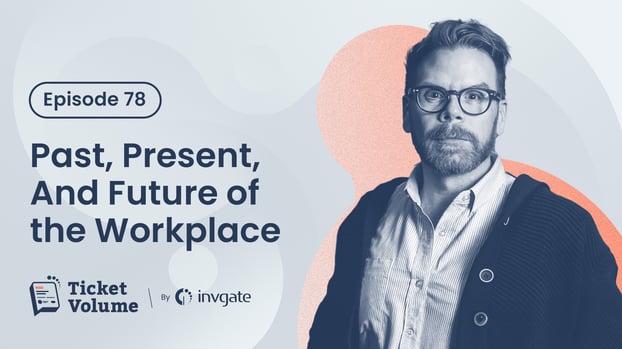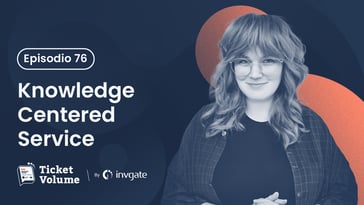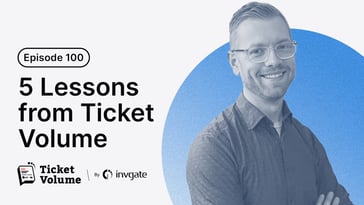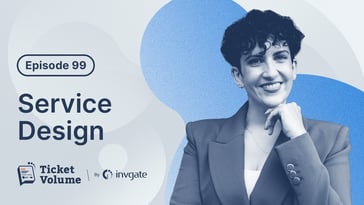Trying to answer the question of what the future of the workplace will look like seems to be a never ending discussion. Of course, this interests both employers and employees, who tend to feel uncertain about the constantly changing landscape and put a lot of thought and effort into arriving prepared for what’s coming.
In view of this, on the 78th episode of Ticket Volume, Christopher Dancy, also known as “The World’s Most Connected Person” and a highly recognized voice within the ITSM community, came to discuss this topic.
However, to do so, he invited both Matt Beran, our host, and the listeners to shift slightly the focus of the discussion. Instead of trying too hard to make out what the future will bring, he invited the audience to first take a closer look at where we come from and where we are at today when it comes to the workplace.
And this mindset counts both for the future of work dynamics and for possible upcoming technologies, which are the two main aspects that Chris explored during the episode.
Here we will summarize the conversation's main points, breaking down the insights the guest brought with him to analyze the future of the workplace.

Breaking past fears and doubts of the future workplace
Because, more often than not, ruminating about the future can bring unnecessary amounts of fear and uncertainty, Christopher started off the episode stating that he no longer resonates too much with the concept “the future of work.”
In this sense, when asked about this in the past, he used to build up an answer bringing up certain tools, technology, or values that organizations should focus on. However, now he prefers to invite people to take a good look at the present of their workplace to see what’s working and what’s not, before eventually making plans for the future.
|
|
"I’m absurdly uncomfortable with the concept of “the future of work,” because I think both of these things don’t exist anymore. I think people planning for the future underestimate the present. And I think people who are focusing on work underestimate living. And I don’t think I would have said that ten years ago, where I would be focusing on, you need to use this technology, or this system, or consider these cultural values. But we are way past that. Most of the planet is on fire, or burning. A majority of the planet is underserved, malnourished, underprivileged, un-haused (...) So, when you asked me to speak about the future of work I was really overwhelmed, because I think we really need to get grounded into the present reality before we can focus on the future." Christopher Dancy |
Instead of drawing more uncertainty to an already difficult context, Christopher defined that, in a nutshell, the future of the workplace will necessarily involve “bringing your values into a world that desperately needs them.” This, he found, is what is primarily missing today.
So, regardless of the tools, systems, or processes you choose to put in place, it’s crucial to enable people to show up to work while still maintaining their values, singularities, and uniqueness. And, instead of avoiding this, taking advantage of its possibilities.
Down the same line, he stressed the current importance of incorporating a space for mental health awareness and providing the time and resources for people to effectively work and invest in themselves so they can show up to the workplace more grounded and in line with their capacities.
The future of technology
When asked about where the future of technology falls in all of this, during the second half of the episode Chris advised people to take a look at historically what has happened, or what he calls exploring “where we come from.”
For this, the guest provided a quick overview of how IT has evolved throughout the years, from the 80s box software that turned first into servers and network cables, then into cloud infrastructure and mobile apps, and finally into no-code and Artificial Intelligence (AI).
The logic he sees behind this evolution, that can help us understand the future, is a shift towards what he likes to call “adaptive platforms,” with less and less interface with each new evolution that comes into place.
|
|
"So what’s coming next? What would be the next logical thing? The next logical thing in my opinion is something I’ve been saying since 2008, and it’s what does life look like when there is no physical interface? IT and most of work today is about controlling things we can see. And what I know in my 35 years in IT is that there is no interface. Everytime you give me an interface, you pull it away." Christopher Dancy |
So, whether it’s wearable computing or alternative realities, the tendency is to drive the interface and the user closer to each other. With this cutting down both on costs and complexities, the next question is “How are we going to manage the lack of an interface?”
For Christopher, we are going to be left with the conditions and reactions of these technologies, and it’s from there that we will be able to build the future of the workplace.
To sum up
Episode 78th of Ticket Volume was guided by a fundamental question and shift of focus: What if it’s not so much about trying to guess and stay ahead of the future of the workplace, but more about making space to get together and discuss what we believe it should look like.
Here we described the main topics discussed during the conversation with Christopher Dancy, but there is much more where this came from. You can access the full episode on Apple Podcasts, Spotify, YouTube, or your favorite podcast platform.















